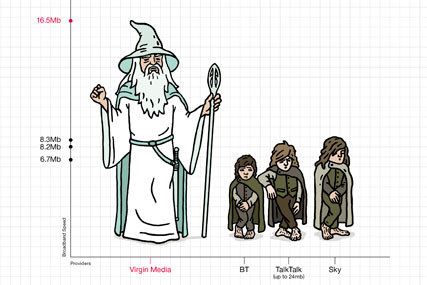
The research, conducted by ICM on behalf of Virgin Media, showed nine out of 10 customers found broadband advertising misleading, while just 9% of people thought advertised broadband speeds tended to be accurate.
The research comes after the Advertising Standards Authority instructed the Advertising Code-writing bodies in July to review broadband claims in advertising and follows the findings on the gap between actual and advertised speeds, .
Of the 1,000 people interviewed for the research, only 2% said they found the current approach to advertising "up to" speeds the most helpful when choosing a broadband provider (ISP).
More than a third of respondents to the ICM study – 41% of people – said they would be willing to pay more for their broadband service if they could be sure of a faster broadband connection.
The study also found that 93% of people believed ISPs should only advertise the typical speed received by the majority of customers, and 94% of people believed broadband providers should advertise consistent information about broadband speeds, to allow consumers to make fair comparisons.
Following the findings, Virgin Media is to publish the typical average speeds its customers receive each month across its 10Mb, 20Mb and 50Mb services, at .
Jon James, executive director of broadband, at Virgin Media said: "People are paying for faster and faster broadband, but are being ripped off by unscrupulous providers who can’t deliver their promised speeds to even a single customer.
"A change in advertising is urgently needed to build consumer confidence in super-fast broadband, and the industry more generally. In the meantime, I hope other ISPs will quickly follow Virgin Media’s lead by disclosing their own monthly performance data, so people can make an informed decision about how to spend their money."
In July, Ofcom published research that showed internet service providers, such as Orange and TalkTalk, were not consistently delivering advertised broadband speeds, and revealed a "growing gap" between speeds advertised and those subscribers actually get.
The ASA announced it would look into broadband advertising in June and asked the Advertising Code-writing bodies (CAP and BCAP) to review broadband speed claims in ads as part of a wider look at advertising in the telecoms sector.
The research comes after the Advertising Standards Authority instructed the Advertising Code-writing bodies in July to review broadband claims in advertising and follows the findings on the gap between actual and advertised speeds, .
Of the 1,000 people interviewed for the research, only 2% said they found the current approach to advertising "up to" speeds the most helpful when choosing a broadband provider (ISP).
More than a third of respondents to the ICM study – 41% of people – said they would be willing to pay more for their broadband service if they could be sure of a faster broadband connection.
The study also found that 93% of people believed ISPs should only advertise the typical speed received by the majority of customers, and 94% of people believed broadband providers should advertise consistent information about broadband speeds, to allow consumers to make fair comparisons.
Following the findings, Virgin Media is to publish the typical average speeds its customers receive each month across its 10Mb, 20Mb and 50Mb services, at .
Jon James, executive director of broadband, at Virgin Media said: "People are paying for faster and faster broadband, but are being ripped off by unscrupulous providers who can’t deliver their promised speeds to even a single customer.
"A change in advertising is urgently needed to build consumer confidence in super-fast broadband, and the industry more generally. In the meantime, I hope other ISPs will quickly follow Virgin Media’s lead by disclosing their own monthly performance data, so people can make an informed decision about how to spend their money."
In July, Ofcom published research that showed internet service providers, such as Orange and TalkTalk, were not consistently delivering advertised broadband speeds, and revealed a "growing gap" between speeds advertised and those subscribers actually get.
The ASA announced it would look into broadband advertising in June and asked the Advertising Code-writing bodies (CAP and BCAP) to review broadband speed claims in ads as part of a wider look at advertising in the telecoms sector.


.jpg)


.jpg)